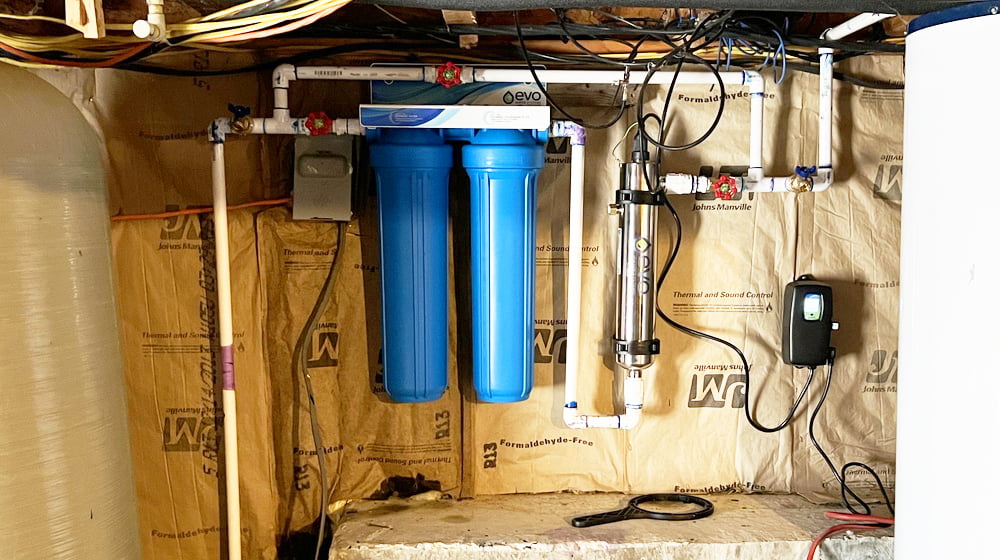Introduction
Clean and safe drinking water is a fundamental need, but sometimes our tap water isn’t as pure as we’d like it to be. One common issue is the presence of chlorine, a disinfectant added to water to kill harmful microorganisms.
While chlorine serves its purpose, it can also leave an unpleasant taste and odor in the water. The good news is that various water filters are designed to tackle this issue head-on. In this article, we’ll explore some of the best water filters for chlorine removal.
Comparison Chart of Water Filters for Chlorine
Here’s a quick overview of the top water filters for chlorine removal:
| Filter Model | Type | Application | Flow Rate | Certifications |
| SpringWell Whole House Filter | Whole House | Entire Home | 12 GPM | NSF/ANSI |
| Clearly Filtered Pitcher | Pitcher | Countertop | N/A | NSF/ANSI 42, 53 |
| Kind E-1000 POE | Cartridge POE | Whole House | 10 GPM | NSF/ANSI 42, 61 |
| Epic Pure Dispenser | Dispenser | Countertop | 1 GPM | NSF/ANSI 42, 53, 401 |
| ProOne Big+ Countertop Filter | Countertop | Countertop | N/A | Independent Lab Test |
| Epic Smart Shield | Under-Sink | Under-Sink | 0.5 GPM | NSF/ANSI 42, 53 |
| PUR Plus Faucet Filtration | Faucet Filter | Faucet | 0.5 GPM | NSF/ANSI 42, 53 |
| AquaBliss Shower Filter | Shower Filter | Shower | N/A | Independently Tested |
Reviews of The Best Water Filters That Remove Chlorine 2024
SpringWell Water Whole House Water Filter System – Top Whole House Filter
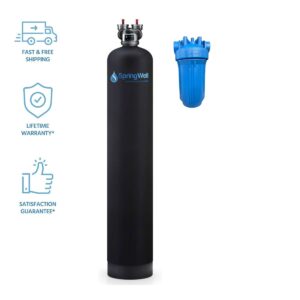
When it comes to ensuring every drop of water in your home is chlorine-free, the SpringWell Water Whole House Water Filter System takes the lead. This robust filtration system is designed to provide your entire household with clean and refreshing water, free from the taste and odor of chlorine.
Key Features:
Effective Chlorine Removal: The SpringWell Whole House Filter employs advanced catalytic carbon media that excels at removing chlorine and chloramine from water, ensuring that every faucet in your home delivers water that’s free from these disinfectants.
NSF/ANSI Certification: This system boasts NSF/ANSI 42 and 61 certifications, guaranteeing its effectiveness in reducing chlorine, chloramine, and other contaminants while maintaining water safety standards.
Impressive Flow Rate: With a flow rate of 12 gallons per minute (GPM), the SpringWell filter ensures that your household’s water needs are met without compromising on filtration quality.
Durable Build: Crafted with quality materials, this system is designed to last. Its stainless steel construction ensures longevity and resistance to corrosion.
Pros:
Whole House Coverage: The SpringWell water filter is perfect for households of all sizes, delivering chlorine-free water to every tap, shower, and appliance.
Easy Maintenance: Water Filter replacement is a breeze with this system. The water filter cartridges are easy to change, making maintenance hassle-free.
Improves Water Quality: By removing chlorine and its byproducts, the SpringWell Water filter not only improves the taste and smell of your water but also enhances the overall quality for drinking water, cooking, and bathing.
Dedicated Customer Support: SpringWell is known for its excellent customer service, ensuring that you’ll have assistance if any questions or concerns arise.
Cons:
Professional Installation: Due to its whole house application, installation might require professional help, adding to the upfront cost.
Space Requirements: The system’s size might necessitate a dedicated space for installation, which could be a challenge in smaller homes.
Final Verdict: Who is it for?
The SpringWell Water Whole House Water Filter System is an ideal choice for those who prioritize comprehensive chlorine removal throughout their entire home. If you’re tired of dealing with the taste and odor of chlorine in your water and want a solution that benefits every tap, shower, and appliance, this water filter system is worth considering.
It’s best suited for homeowners who are willing to invest in a top-tier filtration solution and value the peace of mind that comes with NSF/ANSI-certified water quality.
In conclusion, the SpringWell Whole House Water Filter System sets a high standard for chlorine removal, ensuring that your household’s water is not only safe but also a pleasure to use.
Clearly Filtered Water Pitcher
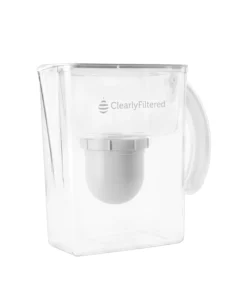
When it comes to a simple and effective solution for chlorine removal in your drinking water, the Clearly Filtered Water Filter Pitcher stands out. This water filter pitcher is designed to transform tap water into clean, crisp, and chlorine-free hydration.
Key Features:
Comprehensive Filtration: The Clearly Filtered Water Filter Pitcher utilizes a multi-stage filtration process that includes activated carbon and proprietary media to effectively remove chlorine, as well as other contaminants like heavy metals, pesticides, and more.
NSF/ANSI Certification: With NSF/ANSI 42 and 53 certifications, this pitcher filter is backed by independent testing, assuring its ability to significantly reduce chlorine and various other harmful substances.
Convenient Design: The water filter pitcher’s sleek design fits perfectly in your fridge, ensuring you always have access to refreshing and chlorine-free water.
Long-lasting Filters: A single water filter cartridge can provide up to 100 gallons of filtered water, making it a cost-effective choice for households of varying sizes.
Pros:
User-Friendly: The Clearly Filtered Water Filter Pitcher requires no installation or plumbing. Simply fill it with tap water, and it does the rest.
Removes Multiple Contaminants: Beyond chlorine removal, this water filter pitcher addresses a range of common contaminants, improving the overall quality and taste of your drinking water.
Portability: If you move or travel frequently, this water filter pitcher can go wherever you do, providing chlorine-free water wherever you are.
Affordable: The initial investment and ongoing water filter replacement costs are relatively low, making this water filter pitcher an accessible choice for most budgets.
Cons:
Limited Capacity: The pitcher’s capacity might be insufficient for larger households or when hosting gatherings.
Regular Filter Replacement: While filter replacement is simple, it’s important to adhere to the replacement schedule to ensure optimal filtration.
Final Verdict: Who is it For?
The Clearly Filtered Water Pitcher is an excellent choice for individuals, couples, or smaller households who are primarily concerned about chlorine in their drinking water. If you want a hassle-free way to enjoy chlorine-free water without the need for installation or plumbing modifications, this water filter pitcher is tailor-made for you.
Its NSF/ANSI certifications provide the assurance of effective filtration, making it an appealing option for health-conscious individuals who value the convenience of clean and great-tasting water right from their fridge.
In summary, the Clearly Filtered Water Pitcher is a reliable and practical solution for chlorine removal, making it easy to quench your thirst with purified water that’s free from chlorine and a range of other contaminants.
Kind E-1000 Whole House Water Filter – Cartridge Based POE
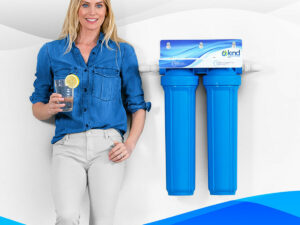
When it comes to an efficient and cartridge-based solution for chlorine removal throughout your entire home, the Kind E-1000 Whole House Water Filter takes the spotlight. This system offers a robust approach to ensuring chlorine-free water for all your household needs.
Key Features:
Cartridge-based Filtration: The Kind E-1000 utilizes a high-grade carbon cartridge that effectively removes chlorine, chloramine, and other impurities from your water supply, enhancing its taste and odor.
NSF/ANSI Certification: With NSF/ANSI 42 and 61 certifications, this system has been rigorously tested and certified for its chlorine reduction capabilities while meeting safety standards.
Generous Flow Rate: The Kind E-1000 boasts a commendable flow rate of 10 gallons per minute (GPM), making it suitable for homes with multiple faucets and appliances.
Durable Housing: Designed with durability in mind, the system’s housing is built to withstand the demands of whole house filtration.
Pros:
Whole House Solution: If you’re seeking a chlorine-free water supply for showers, laundry, cooking, and more, the Kind E-1000 is engineered to provide consistent filtration throughout your entire home.
Simple Maintenance: Water filter cartridge replacement is straightforward and requires minimal effort, ensuring that your water remains chlorine-free with ease.
Versatile Application: This system is adaptable to various water sources, making it suitable for well water or municipally treated water.
Improved Water Quality: Beyond chlorine removal, the Kind E-1000 also tackles other common water impurities, ensuring your household’s water quality is elevated.
Cons:
Professional Installation: Installation might require professional assistance, adding to the initial setup cost.
Space Consideration: The system’s housing might necessitate a dedicated space for installation, which could be a limitation in smaller residences.
Final Verdict: Who is it For?
The Kind E-1000 Whole House Water Filter is an excellent choice for households that value convenience and comprehensive chlorine removal. If you’re frustrated with the presence of chlorine and its effects on water quality throughout your home, this system is worth considering.
It’s best suited for homeowners who are willing to invest in a durable and effective chlorine removal solution, especially those who have concerns about water safety and quality due to the NSF/ANSI certifications.
In summary, the Kind E-1000 Whole House Water Filter offers a reliable and efficient way to enjoy chlorine-free water in every corner of your home. Whether it’s for bathing, cooking, or simply staying hydrated, this system ensures that your water is free from chlorine and ready for all your household needs.
Epic Pure Water Filter Dispenser
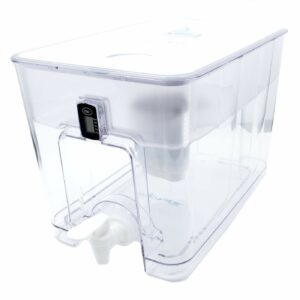
When it comes to countertop convenience and chlorine removal, the Epic Pure Water Filter Dispenser takes center stage. This dispenser offers an accessible way to enjoy chlorine-free water without the need for complex installation or plumbing modifications.
Key Features:
Efficient Filtration: The Epic Pure Dispenser uses a combination of activated carbon and proprietary media to effectively remove chlorine, chloramine, and a range of other contaminants, ensuring your water tastes and smells clean and fresh.
Triple Certification: With NSF/ANSI 42, 53, and 401 certifications, this dispenser is independently tested and certified for its ability to reduce chlorine, heavy metals, pharmaceuticals, and more.
User-friendly Design: The countertop dispenser is designed for simplicity. Just fill the top reservoir with tap water, and let the system do the work in providing chlorine-free water.
Decent Flow Rate: With a flow rate of 1 gallon per minute (GPM), the Epic Pure Dispenser offers a steady supply of filtered water for drinking and cooking.
Pros:
No Installation Required: The countertop design eliminates the need for installation or plumbing modifications. Simply fill and enjoy.
Comprehensive Filtration: Beyond chlorine, the Epic Pure Dispenser addresses a wide array of contaminants, ensuring that your drinking water is pure and safe.
Portable Solution: If you have limited space or frequently move, this dispenser can easily travel with you, providing chlorine-free water wherever you go.
Affordable Convenience: The dispenser offers a cost-effective way to enjoy chlorine-free water without the need for a whole house system or under-sink installation.
Cons:
Limited Capacity: The dispenser’s capacity may require more frequent refills compared to larger filtration systems.
Regular Filter Replacement: Adhering to the recommended filter replacement schedule is important to maintain optimal filtration performance.
Final Verdict: Who is it Best For?
The Epic Pure Water Filter Dispenser is an excellent choice for individuals, couples, or small families seeking a convenient way to enjoy chlorine-free drinking and cooking water.
If you want to bypass the complexities of installation and plumbing modifications while still benefiting from comprehensive filtration, this dispenser is tailored to your needs.
Its triple NSF/ANSI certifications provide the assurance of effective filtration, making it an appealing option for health-conscious individuals who value the convenience of clean and great-tasting water.
In conclusion, the Epic Pure Water Filter Dispenser delivers on its promise of accessible and chlorine-free hydration. It offers a practical and efficient solution for those who prioritize clean water and seek an easy-to-use countertop dispenser that enhances their daily drinking and cooking experience.
ProOne Big+ Gravity-Fed Countertop Water Filter
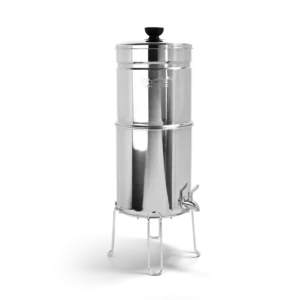
For those seeking a gravity-fed and countertop-friendly solution to chlorine removal, the ProOne Big+ Gravity-Fed Water Filter takes the spotlight. This filtration system provides a convenient way to ensure chlorine-free water for your drinking and cooking needs.
Key Features:
Gravity-Fed Filtration: The ProOne Big+ utilizes gravity to filter water through its high-grade carbon and ceramic elements, effectively removing chlorine, chloramine, and various contaminants, while retaining beneficial minerals.
Independent Lab Testing: While lacking specific flow rate data, this system boasts the validation of independent lab tests, confirming its chlorine removal and filtration capabilities.
Compact Design: The countertop-friendly design makes the ProOne Big+ a space-efficient option, ensuring clean water is readily available for your family.
Durable Build: The system’s ceramic water filters are built to last, offering longevity and reliable filtration performance.
Pros:
No Installation Needed: The gravity-fed design requires no installation or plumbing modifications, making it a straightforward solution for chlorine-free water.
Comprehensive Filtration: Beyond chlorine, the ProOne Big+ addresses a range of contaminants, ensuring that your drinking water is purified and safe.
Portability: If you move or want to enjoy chlorine-free water in multiple locations, this system can easily accompany you.
Cost-Effective: The initial investment and long-lasting water filters make this system an economical choice for those seeking chlorine removal.
Cons:
Flow Rate Information: Specific flow rate details are not readily available, which might be a consideration for those with higher water consumption needs.
Regular Water Filter Maintenance: Proper maintenance and regular cleaning of the ceramic water filters are essential to ensure optimal filtration performance.
Final Verdict: Who is it For?
The ProOne Big+ Gravity-Fed Water Filter is an ideal choice for individuals, couples, or small households who are looking for a hassle-free solution to chlorine removal.
If you value the simplicity of a gravity-fed system and want to enjoy clean, chlorine-free water without installation or plumbing complexities, this countertop water filter is tailored to your needs. Its validation through independent lab testing adds credibility to its filtration capabilities.
In summary, the ProOne Big+ Gravity-Fed Water Filter offers a practical and efficient way to enjoy chlorine-free water for drinking and cooking. While lacking specific flow rate data, its gravity-fed mechanism ensures a continuous supply of purified water that’s free from chlorine and a variety of other contaminants.
Epic Smart Shield Under-Sink Filter

When it comes to efficient chlorine removal and under-sink convenience, the Epic Smart Shield takes the lead. This under-sink water filter offers a compact solution to ensure chlorine-free water directly from your tap water.
Key Features:
Under-Sink Installation: The Epic Smart Shield is designed to fit neatly under your sink, providing a dedicated solution for chlorine removal at the point of use.
Dual-Certified Filtration: This system boasts NSF/ANSI 42 and 53 certifications, ensuring its ability to effectively reduce chlorine, contaminants, and undesirable tastes and odors.
Decent Flow Rate: With a flow rate of 0.5 gallons per minute (GPM), the Epic Smart Shield offers a steady supply of clean, chlorine-free water for drinking, cooking, and more.
Compact Design: The compact nature of this water filter system ensures it doesn’t take up excessive space under your sink.
Pros:
Focused Filtration: The Epic Smart Shield targets chlorine and other impurities directly from your tap, providing a consistent source of chlorine-free water for your daily needs.
Space-Saving: The under-sink design ensures that your kitchen remains clutter-free while still enjoying the benefits of chlorine removal.
Simple Maintenance: Water filter replacement is easy, and the system’s compact design makes it accessible for routine maintenance.
Enhanced Taste and Quality: By removing chlorine, this water filter improves the taste and quality of your drinking and cooking water.
Cons:
Installation Complexity: While not overly complicated, under-sink installations might require some DIY skills or professional assistance.
Limited Application: The filtration is limited to the sink it’s installed under, so other areas of your home won’t benefit from chlorine removal.
Final Verdict: Who is it For?
The Epic Smart Shield is an excellent choice for those who prioritize chlorine removal at the point of use and want the convenience of an under-sink system. If you’re looking for a compact solution to ensure chlorine-free water for drinking and cooking, without altering the aesthetics of your kitchen, this water filter is well-suited to your needs.
Its NSF/ANSI certifications provide the assurance of effective filtration, making it an appealing option for health-conscious individuals who value convenience and clean water.
In conclusion, the Epic Smart Shield offers an effective and space-efficient solution for chlorine removal, ensuring that your drinking and cooking water is free from chlorine’s taste and odor. It’s designed for individuals and families who seek an under-sink water filter that delivers on its promise of clean and chlorine-free water.
PUR Plus Faucet Filtration System
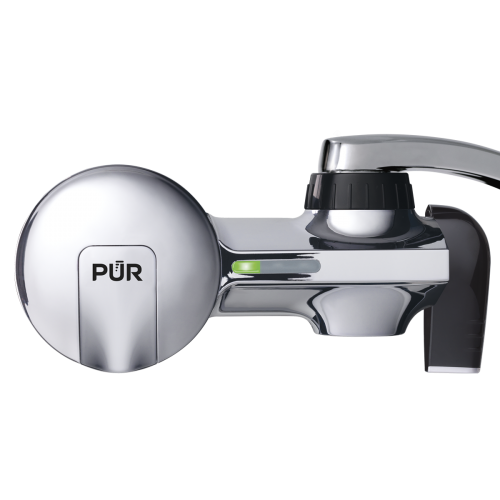
When convenience meets effective chlorine removal, the PUR Plus Faucet Filtration System stands out. This system offers a straightforward and accessible way to enjoy chlorine-free water straight from your faucet.
Key Features:
Faucet Attachment: The PUR Plus system attaches directly to your faucet, providing instant access to chlorine-free water without the need for complex installation.
Dual-Certified Filtration: With NSF/ANSI 42 and 53 certifications, this system is rigorously tested and certified for its ability to reduce chlorine, contaminants, and undesirable tastes and odors.
Compact Design: The sleek and compact design of the faucet attachment ensures it doesn’t interfere with your kitchen aesthetics while providing clean water.
Decent Flow Rate: With a flow rate of 0.5 gallons per minute (GPM), the PUR Plus system delivers chlorine-free water at a steady pace for your drinking and cooking needs.
Pros:
Instant Chlorine Removal: With its faucet attachment, the PUR Plus system ensures that your drinking water is chlorine-free and ready to use without any wait.
User-Friendly: Installation is a breeze – simply attach the system to your faucet and start enjoying clean, chlorine-free water.
Convenience: The faucet attachment is a hassle-free solution that requires no plumbing modifications, making it a popular choice for those seeking immediate chlorine removal.
Cost-Effective: The initial cost and ongoing water filter replacement expenses are relatively low, making this system an economical choice for those prioritizing chlorine removal.
Cons:
Limited Application: The filtration is restricted to the faucet it’s attached to, so other water sources in your home won’t benefit from chlorine removal.
Aesthetic Consideration: While compact, the faucet attachment does alter the appearance of your faucet to some extent.
Final Verdict: Who is it Best For?
The PUR Plus Faucet Filtration System is an ideal choice for individuals, couples, or small households who value instant access to chlorine-free drinking and cooking water. If you’re seeking a convenient solution that doesn’t involve installation or plumbing modifications, this faucet attachment is tailored to your needs.
Its dual NSF/ANSI certifications provide the assurance of effective filtration, making it a suitable option for those who want immediate chlorine removal with minimal effort.
In summary, the PUR Plus Faucet Filtration System offers an uncomplicated and effective solution for chlorine removal, ensuring that your drinking and cooking water is chlorine-free and ready to use straight from your faucet.
It’s designed for those who appreciate the simplicity of a faucet attachment while enjoying the benefits of clean and great-tasting water.
AquaBliss High Output Revitalizing Shower Filter
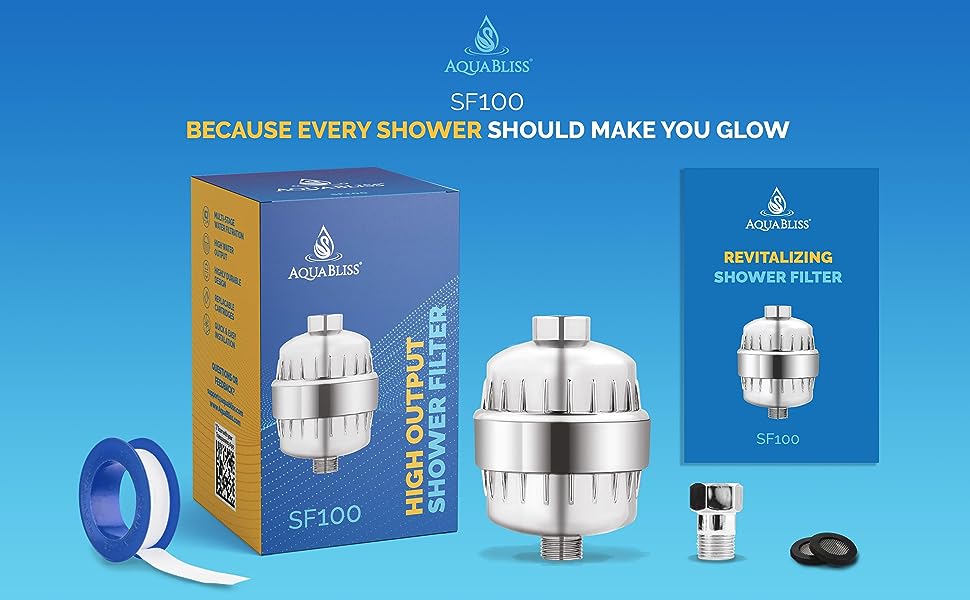
When it comes to preserving your skin and hair while enjoying chlorine-free showers, the AquaBliss High Output Revitalizing Shower Water Filter takes the spotlight. This shower water filter offers a rejuvenating way to minimize the impact of chlorine during your daily showers.
Key Features:
Shower Attachment: The AquaBliss Shower Water Filter easily attaches to your existing shower head, providing an effortless way to enjoy chlorine-free water during your showers.
High Output Filtration: This system utilizes a multi-stage filtration process to effectively reduce chlorine and other impurities, delivering water that’s gentler on your skin and hair.
Independently Tested: While specific flow rate data might not be readily available, the AquaBliss water filtration system is independently tested and verified for its ability to reduce chlorine and enhance shower water quality.
Easy Installation: The tool-free installation process ensures that you can enjoy chlorine-free showers without any plumbing complications.
Pros:
Healthy Skin and Hair: By reducing chlorine and its potential negative effects, the AquaBliss Shower Filter helps maintain the health and vitality of your skin and hair.
User-Friendly: Attaching the filter to your shower head is a straightforward process, offering a hassle-free way to enjoy chlorine-free showers.
Compact Design: The compact size of the shower filter doesn’t disrupt the overall aesthetics of your bathroom.
Affordable Comfort: The reasonable price and filter lifespan make this system a cost-effective way to enhance the quality of your showers.
Cons:
Limited Application: The filtration is restricted to your shower, so other water sources won’t benefit from chlorine removal.
Regular Filter Replacement: Adhering to the replacement schedule is essential to ensure optimal filtration performance and continued chlorine removal.
Final Verdict: Who is it For?
The AquaBliss High Output Revitalizing Shower Filter is an excellent choice for anyone who wants to minimize the effects of chlorine on their skin and hair during showers.
If you value the health of your skin and the luster of your hair and are seeking a solution that requires minimal effort and no plumbing alterations, this shower water filtration system is tailored to your needs. Its independent testing adds credibility to its ability to enhance shower water quality.
In conclusion, the AquaBliss High Output Revitalizing Shower water filtration system offers a refreshing and chlorine-free shower experience, ensuring that your skin and hair stay vibrant and healthy. It’s designed for individuals who seek a rejuvenating shower routine while benefiting from the reduction of chlorine and other impurities in their water.
Chlorine Water Filter Buyer’s Guide
Selecting the right chlorine water filter involves several factors to consider, ensuring you make an informed choice that aligns with your needs. Here’s a comprehensive buyer’s guide to help you navigate your options:
What is Chlorine?
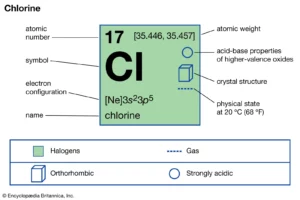
Chlorine is a chemical element commonly used in water treatment facilities to disinfect drinking water. Its antimicrobial properties make it effective in killing harmful bacteria, viruses, and parasites, safeguarding public health.
Why is Chlorine Added to Drinking Water?
Chlorine is added to drinking water as a disinfectant to destroy disease-causing microorganisms. It serves as a vital step in the water treatment process, ensuring that waterborne illnesses are prevented and public health is protected.
However, while chlorine plays a crucial role in water safety, its taste, odor, and potential effects on skin and hair have led to the demand for chlorine removal solutions.
By understanding the purpose of chlorine in water treatment, consumers can make informed decisions about filtration methods that effectively balance water safety with the desire for improved taste, odor, and overall water quality.
Is Chlorine in Tap Water Safe or Dangerous?
The presence of chlorine in tap water is generally considered safe and is a result of the water treatment process. Water treatment facilities add chlorine to disinfect water and kill harmful microorganisms that can cause diseases.
The levels of chlorine used are carefully regulated to ensure that they are effective in disinfection while remaining within safe limits for human consumption.
However, while chlorine itself is not inherently dangerous at the levels used in water treatment, some concerns arise. One primary concern is the taste and odor that chlorine imparts to water, which can be off-putting for many people.
Additionally, some individuals might be more sensitive to the effects of chlorine on their skin and hair, particularly during showers.
Chlorine Effects on Skin and Hair
Chlorine’s potential effects on skin and hair primarily stem from its disinfecting properties. When chlorine interacts with organic matter in water, it can form disinfection byproducts (DBPs), some of which can have mild irritative effects on the skin and scalp.
These effects might include dryness, itching, redness, and in some cases, exacerbating existing skin conditions.
Chlorine can also strip natural oils from the skin and hair, leading to dryness and dullness. For individuals with sensitive skin or those who experience skin conditions like eczema, the chlorine in water can be particularly bothersome.
To mitigate these effects, using chlorine removal filters for showers or considering skincare routines that restore moisture can be helpful. Filters designed specifically for showerheads can effectively reduce chlorine exposure, providing a more skin-friendly shower experience.
How do Chlorine Water Filters Work
Chlorine water filters, regardless of its type, functions by utilizing various filtration methods to remove or reduce chlorine and its associated byproducts from water. The specific mechanisms may differ based on the type of filter, but the goal remains consistent: to provide clean, chlorine-free water for various purposes.
In carbon-based filters (commonly found in pitcher filters, faucet filters, and some whole house systems), activated carbon adsorbs chlorine molecules as water passes through. The porous structure of activated carbon traps chlorine, effectively removing its taste and odor.
Reverse osmosis systems use a semi-permeable membrane to remove chlorine and a wide range of contaminants. Water is forced through the membrane, blocking chlorine molecules and other impurities, resulting in purified water on the other side.
UV (ultraviolet) light systems use UV rays to disinfect water, targeting and neutralizing bacteria, viruses, and chlorine. While UV systems do not remove chlorine directly, they eliminate the need for chlorine as a disinfectant by killing microorganisms.
Types of Water Treatment Systems That Remove Chlorine
Carbon Filters
Carbon filters are one of the most common methods for chlorine removal. It involves using activated carbon, a highly porous material, to adsorb chlorine molecules as water passes through the filter.
This process not only removes chlorine’s taste and odor but can also address some other impurities, depending on the filter’s design.
Activated carbon comes in various forms, including granular activated carbon filters (GAC) and carbon block filters. Granular activated carbon filters are often used in whole house systems, faucet attachments, and pitcher filters.
Carbon block filters, which are densely compacted activated carbon, are commonly found in under-sink filters and some whole house systems. The larger surface area of activated carbon ensures efficient chlorine removal.
Carbon filters are effective at removing chlorine but might have limitations when it comes to other contaminants. Some systems incorporate additional filtration stages to enhance their capabilities.
Reverse Osmosis Systems
Reverse osmosis systems (RO) are a sophisticated water purification process that is highly effective at removing chlorine and a wide spectrum of contaminants from water.
RO systems utilize a semi-permeable membrane that acts as a barrier, allowing only water molecules to pass through while blocking larger particles, impurities, and ions, including chlorine.
RO systems consist of multiple filtration stages, including a pre-filter to remove sediment and chlorine, carbon water filters to further address chlorine and improve taste, and the central RO membrane that performs the primary filtration.
The RO membrane can remove not only chlorine but also heavy metals, minerals, dissolved solids, bacteria, viruses, and other impurities, resulting in purified water.
These systems are commonly installed under sinks (under sink water filters) and are suitable for producing chlorine-free drinking water and cooking water. However, it’s important to note that RO systems can lead to water wastage due to the need to flush away rejected water.
Regular maintenance, including filter replacement, is necessary to ensure optimal performance and water quality.
UV Light
UV (ultraviolet) light water treatment systems offer a unique approach to water disinfection, targeting microorganisms such as bacteria, viruses, and parasites. While UV systems do not directly remove chlorine, they eliminate the need for chlorine as a disinfectant because they render harmful microorganisms inactive.
UV systems consist of a UV lamp or bulb that emits UV-C rays, a wavelength that is lethal to microorganisms. As water passes by the UV lamp, the UV light penetrates the cells of bacteria and viruses, damaging their DNA and preventing them from reproducing and causing illness.
This process effectively disinfects the water, making it safe to drink without the use of chemical disinfectants like chlorine.
UV systems are often used in combination with other filtration methods, such as carbon filters, to address chlorine and other contaminants. They are an ideal choice for individuals who prefer a chemical-free approach to water treatment and are concerned about microbial safety.
Distillation
Distillation is a centuries-old water purification method that relies on the principle of separating water from impurities through the process of boiling, condensation, and collection. Distillation effectively removes chlorine, as well as minerals, heavy metals, and other contaminants, producing purified water.
In the distillation process, water is heated to create steam, which is then cooled and condensed back into water. Because impurities have higher boiling points than water, they are left behind during the heating process, resulting in purified water vapor that is then condensed back into liquid form.
While distillation is reliable for chlorine removal and overall purification, it’s worth noting that the process can be energy-intensive and time-consuming. Distillers are available for home use, producing small quantities of purified water.
They are particularly useful for individuals who want to ensure chlorine-free for your cooking and drinking water, but they might not be as practical for larger household water needs due to the time and energy required.
Considerations When Purchasing a Filter to Remove Chlorine
Selecting the right chlorine filter involves considering several key factors to ensure that the chosen system effectively meets your water quality needs. Here are the primary considerations to keep in mind:
Application
The specific water sources you want to treat for chlorine removal will guide your filter choice. Determine whether you need filtration for the entire household, specific faucets, showers, or just drinking water. Different filter types cater to various applications, so understanding your requirements is crucial.
Whole House Filters: If you want chlorine-free water for all household purposes, including bathing, laundry, and cooking, consider whole house water filters. These systems are installed at the point of entry and treat water before it reaches any tap water.
Faucet Filters: For targeted chlorine removal at specific faucets, such as the kitchen sink or bathroom, faucet filters are a practical choice. They attach directly to the faucet and provide immediate access to clean water.
Shower Filters: If you’re concerned about the effects of chlorine on your skin and hair during showers, these filters are designed to reduce chlorine’s presence in shower water, providing a more pleasant bathing experience.
Under-Sink Water Filters: Under-sink filters are installed beneath the sink and provide chlorine-free cooking and drinking water. They are compact and offer targeted filtration at the point of use.
Countertop Water Filters: The best countertop water filter is often versatile and easy to install. They sit on the countertop and are suitable for providing chlorine-free cooking and drinking water.
Filter Capacity
Filter capacity refers to the amount of water a filter can treat before its effectiveness diminishes and the filter cartridge needs replacement. Understanding filter capacity is essential to ensure that your chosen filter can meet your household’s water consumption demands.
For example, if you’re considering a pitcher filter for drinking water, you’ll want to know how many gallons or liters of water the filter can purify before the filter cartridge requires changing.
Similarly, when evaluating a whole house filter, you’ll want to know its capacity in gallons or liters to ensure that it can effectively treat the water supply to your entire home for an extended period.
Household size, water usage habits, and the filter’s capacity will determine how often you need to replace the filter cartridge. Overusing a filter beyond its capacity can result in reduced filtration efficiency and a return of chlorine taste and odor to your water. On the other hand, replacing the cartridge prematurely might lead to unnecessary expenses.
When comparing filter capacities, think about your daily water usage and how often you’re comfortable with replacing cartridges. Some water filters offer larger capacities and longer lifespans, making them suitable for households with higher water consumption, while others might be better suited for smaller households or individuals.
Flow Rate
The flow rate of a filter refers to the speed at which water flows through the filter and into your tap water or appliances. Flow rate is measured in gallons per minute (GPM) or liters per minute (LPM). It’s an important consideration because it impacts the availability of treated, chlorine-free water for your various needs.
When evaluating flow rate, consider the number of faucets, showers, and appliances that might be in use simultaneously. For instance, in a household where multiple people might be showering, using sinks, and running appliances at the same time, a higher flow rate filter is essential to ensure consistent water pressure and volume.
Whole house filters should have flow rates that accommodate the maximum water demand of your household. In contrast, point-of-use filters, such as under-sink or countertop filters, should provide a sufficient flow rate for the specific tap water or appliances they serve.
It’s worth noting that some filter types, like those that utilize more advanced filtration methods (e.g., reverse osmosis water filter), might have lower flow rates due to the thorough filtration process.
Balance your need for chlorine removal with the flow rate that can adequately support your household’s water usage patterns.
By choosing a filter with an appropriate filter capacity and flow rate, you ensure that you have a reliable source of chlorine-free water that meets the demands of your household without compromising water quality or convenience.
Certifications
Certifications play a critical role in ensuring that a chlorine water filter meets specific performance and safety standards. Reputable certifications provide consumers with confidence in the filter’s ability to effectively remove chlorine and other contaminants while adhering to quality and safety guidelines.
The most recognized certification organization for water treatment products is NSF International.
Look for filters that have received NSF/ANSI certifications relevant to chlorine removal. The NSF/ANSI 42 certification focuses on aesthetic effects, including taste and odor, which are directly related to chlorine removal.
The NSF/ANSI 53 certification addresses health effects, indicating the filter’s ability to remove a range of contaminants, including chlorine byproducts. A filter with both of these certifications is an excellent indicator of its comprehensive chlorine removal capabilities.
Additionally, some filters might carry certifications specific to certain contaminants or technologies. It’s important to research the certifications that align with your water quality concerns and the filter’s intended purpose.
Installation & Maintenance
The ease of installation and ongoing maintenance is a significant consideration when choosing a chlorine water filter. Different filters come with varying installation requirements:
DIY Installation
Faucet filters, some under-sink filters, and countertop filters are designed for easy do-it-yourself installation. They typically come with clear instructions and require minimal tools or plumbing knowledge.
Professional Installation
Whole house filters and some under-sink or reverse osmosis systems might require professional installation due to their complexity. Professional installation ensures that the filter is correctly integrated into your plumbing system for optimal performance.
Maintenance is equally important to maintain consistent chlorine removal and water quality:
Filter Replacement
Regular filter replacement is crucial. Understand the recommended filter replacement schedule and consider the availability and cost of replacement cartridges. Neglecting filter replacement can compromise filtration effectiveness.
Maintenance Frequency
Some filters, like whole house systems, might require occasional maintenance beyond filter replacement. Understand the maintenance tasks required and determine if they align with your preferences and schedule.
By choosing a filter with installation and maintenance requirements that match your skill level and lifestyle, you ensure that chlorine removal remains effective and hassle-free over the filter’s lifespan.
Conclusion
In conclusion, selecting the best water filter for chlorine removal involves a thorough assessment of your water quality concerns, household needs, and preferences. Whether you’re looking for whole house solutions, faucet attachments, under-sink filters, or shower filters, the market offers a range of options to suit various applications.
By considering factors such as filter capacity, flow rate, certifications, installation, and maintenance, you can confidently choose a chlorine water filter that enhances your water quality and supports a chlorine-free lifestyle.
Frequently Asked Questions
Does a chlorine water filter remove other contaminants?
Yes, many chlorine water filters are designed to address a wide range of contaminants beyond chlorine, including taste, odor, heavy metals, and some microorganisms. Check the filter’s certifications and specifications to understand its comprehensive filtration capabilities.
Are chlorine water filters effective for well water?
Yes, a chlorine water filter can be effective for well water, but the specific filter type will depend on the contaminants present. Conduct a water test to identify the impurities in your well water and choose a filter that addresses those concerns.
How often should I replace filter cartridges?
Replacement frequency varies based on the filter type and capacity, as well as your household’s water consumption. Follow the manufacturer’s recommendations for optimal performance.
Can I install a filter myself?
Many filters, especially faucet filters and some under-sink filters, are designed for DIY installation. However, whole house systems and more complex setups might require professional assistance.
Does a chlorine water filter affect water pressure?
Some filters, particularly those with extensive filtration stages like reverse osmosis, might slightly reduce water pressure. However, most filters maintain adequate flow rates for typical household usage.
